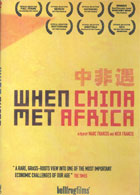
When China Met Africa 2010
Distributed by Bullfrog Films, PO Box 149, Oley, PA 19547; 800-543-FROG (3764)
Produced by Mark Francis and Nick Francis
Directed by Mark Francis and Nick Francis
DVD, color, 75 min. or 60 min. versions
Sr. High - General Adult
African Studies, Asian Studies, Business, Economics, International Relations, Labor Relations, Sociology
Date Entered: 10/27/2011
Reviewed by Wendy Highby, University of Northern ColoradoWhen China Met Africa is an aptly named film about China’s investment in Zambia. In one hour, documentarians Mark and Nick Francis add human interest to the potentially impersonal topic of globalization. With the film’s well-crafted storyline and editing, both the political context and the practical consequences of international trade agreements become evident. Three men are featured throughout: a farm owner, Liu Changming; a road construction project manager, Li Jianguo; and a trade minister, Felix Mutati. And there is a fourth character—an aggregate, a whole class of people—the manual laborers at the farm and on the road-building project. The story of these four characters unfolds in the context of China’s trade with Zambia, an amount exceeding $810 million annually.
The film begins with the big picture, showing footage of the 2006 China–Africa summit in Beijing, and quickly cuts to three years later at the Tian Xiang farm in Zambia. It is owned by the ambitious Liu Changming, a former office worker turned entrepreneurial farmer. Mr. Liu migrated with his family to Zambia in 2001. He is conscious of his place in the hierarchy, noting that “I was an employee in China, while I am an employer in Zambia . . . a totally different position.” The film then cuts to the Luapula Province in Zambia and introduces Li Jianguo, the project manager for a road-building project. China Henan International Corporation has a contract with the Zambian government to rebuild one of the country’s most important roads. The dedicated Li Jianguo says he must “ensure the quality of the works, meet the deadlines, and ensure the company’s profits.” Thirdly, in Lusaka, Zambia’s capital, viewers are introduced to the congenial Felix Mutati, the Minister of Trade, Commerce, and Industry. Mr. Mutati’s diplomatic business trips are documented: first to the Zambia-China Economic Zone in the Copperbelt Province where the largest copper smelter in sub-Saharan Africa is under construction; then to a church service in Mufulira; and finally to Xiamen, China, to a meeting with the Gold Common Investment Group to discuss hotel and mining development.
While no single Zambian laborer is profiled, the fourth character of the film—the working class—appears in scenes that reveal the inequality in the socioeconomic system. On the farm, the film captures the tension between Cheng Fengluan, Mr. Liu’s sister in law, and the farm workers. Ms. Cheng swears at them and admonishes them to work harder. The workers ironically joke that “she thinks we are like cows . . . but in fact we are more like bulldozers.” When Mr. Liu is short on cash, he pays his farm workers only a partial wage, and refuses to provide tents for them. The management-worker relations on the road construction project are also tense. In one of the few instances in the film in which laborers directly speak to the camera, the road workers explain that their expectations haven’t been met; they don’t feel they are treated as equals, or even as people. While these scenes arguably illustrate the neo-colonialism inherent in the situation, the film is ultimately even-handed and concludes with vignettes acknowledging the owner/manager viewpoint. The road project lacks sufficient funding and Mr. Li regrets he must lay off four managers. Mr. Liu emotionally speculates about his future heirs living on the farm.
The film is accessible, yet nuanced and complex enough to be used to support either pro- or anti-globalization arguments. The DVD contains two versions of the film. The lengthier version is 75 minutes and includes additional footage of Mr. Mutati’s diplomatic trips, while the classroom version is 60 minutes with a few curse words redacted. The film potentially pertains to a wide range of disciplines, including African studies, Asian studies, business, economics, international relations, labor relations, and sociology. When China Met Africa will present students with an engaging and very human portrait of foreign investment and globalization.
Awards
- Margaret Mead Film Festival, Best Filmmaker Award, 2010